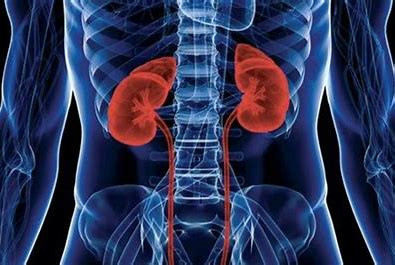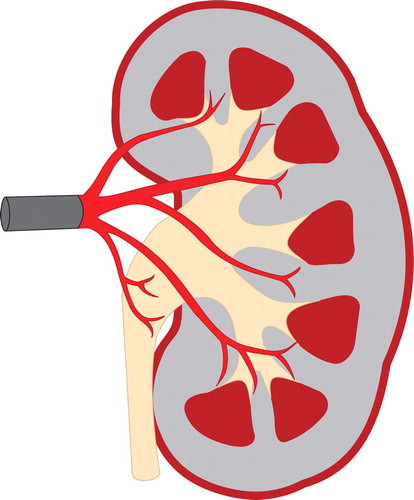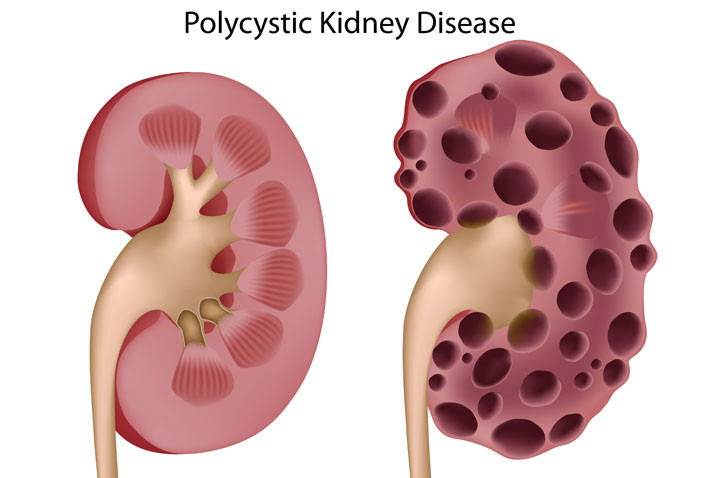Definisi
Sindrom nefritik adalah kumpulan gejala yang muncul karena pembengkakan dan peradangan glomerulus di ginjal atau disebut penyakit glomerulonefritis. Glomerulus adalah unit penyaringan terkecil yang ada di dalam ginjal. Fungsi dari glomerulus adalah menyaring zat-zat sisa yang ada di darah kemudian mengalirkannya ke sel berikutnya. Gangguan pada sel glomerulus akan menyebabkan menurunnya kemampuan ginjal untuk menyaring darah dan mengeluarkan urin normal. Kondisi ini harus ditangani dengan cepat karena berpotensi menyebabkan kerusakan permanen pada ginjal.
Baca juga : Sindrom Nefrotik
Penyebab
Penyebab sindrom nefritik adalah respon imun yang terjadi karena infeksi atau penyakit lain. Kondisi glomerulonefritis adalah salah satu penyebab awal sindrom nefritik. Peradangan pada sel glomerulus sedikit berbeda pada anak dan orang dewasa.
Anak dan Remaja
Penyebab tersering pada anak dan remaja adalah :
- Glomerulonefritis pasca-streptokokus. Kelainan ginjal yang terjadi setelah infeksi dari bakteri streptokokus. Infeksi bakteri streptokokus terjadi pada tenggorokan atau kulit. Glomerulonefritis terjadi dalam kurun waktu 1-3 minggu setelah infeksi streptokokus di bagian tubuh lain.
- Sindrom uremik hemolitik. Infeksi sistem cerna akan menghasilkan racun yang menghancurkan sel darah merah dan dapat menyebabkan cedera ginjal.
- Purpura Henoch-schonlein. Penyakit yang ditandai dengan bercak keunguan di kulit, nyeri sendi, gangguan saluran cerna, dan glomerulonefritis.
- Nefropati IgA. Kelainan yang terjadi saat antibodi IgA menumpuk di jaringan ginjal.
Dewasa
Penyebab sindrom nefritik tersering pada orang dewasa yaitu :
- Abses abdomen
- Sindrom Goodpasture (kelainan sistem imun yang menyerang glomerulus)
- Infeksi hepatitis B atau C
- Endokarditis (peradangan pada lapisan dalam ruang jantung dan katup jantung akibat infeksi bakteri)
- Glomerulonefritis membranoproliferatif (kelainan yang menyebabkan peradangan dan perubahan sel ginjal)
- Glomerulonefritis progresif cepat (salah satu golongan glomerulonefritis yang menyebabkan kerusakan fungsi ginjal dalam waktu cepat)
- Nefritis lupus (komplikasi dari penyakit lupus)
- Vaskulitis (peradangan pembuluh darah)
- Infeksi virus seperti campak
Peradangan yang terjadi di glomerulus menyebabkan penyaringan darah tidak maksimal. Hal ini akan menyebabkan adanya protein dan darah di dalam urin serta penumpukan cairan di dalam tubuh. Pembengkakan di tubuh terjadi ketika darah kehilangan protein albumin. Albumin berfungsi untuk mempertahankan cairan tetap berada di dalam pembuluh darah. Bila albumin berkurang dalam darah, cairan akan berpindah ke jaringan tubuh.
Faktor Risiko
Beberapa faktor risiko terjadinya sindrom nefritik adalah :
- Riwayat infeksi streptokokus sebelumnya. Terutama infeksi saluran pernapasan atau kulit.
- Memiliki penyakit lupus atau kelainan autoimun lainnya.
- Memiliki riwayat penyakit ginjal pada keluarga
Gejala
Terdapat banyak gejala yang dapat menunjukkan adanya sindrom nefritik. Namun, beberapa gejala khas yang pasti terjadi pada sindrom nefritik adalah :
- Darah pada urin. Urin berwarna gelap, kecoklatan, atau keruh. Urin dapat terlihat berbuih karna kandungan protein.
- Tekanan darah tinggi
- Pengeluaran urin berkurang, hampir tidak ada
- Pembengkakan pada sekitar mata dan kaki. Bengkak pada mata sering terjadi di pagi hari, sementara pada kaki di malam hari.
Selain itu, gejala yang dapat muncul tergantung dari penyakit penyebab sindrom nefritik ini. Beberapa diantaranya yaitu :
- Penglihatan kabur. Dikarenakan pecahnya pembuluh darah di retina mata
- Batuk berdarah atau berdahak. Terjadi karena penumpukan cairan di paru
- Sesak napas
- Letih, lelah, cenderung mengantuk, kebingungan, sakit kepala
- Demam
Diagnosis
Diagnosis sindrom nefritik dapat ditegakkan dari gejala yang dialami. Dokter akan melakukan analisis dari gejala serta pemeriksaan yang berguna untuk mengkonfirmasi dan mencari penyebab penyakit. Pemeriksaan fisik yang biasa dilakukan meliputi pemeriksaan tekanan darah, pemeriksaan mata, leher, jantung, paru, perut, hingga kaki. Beberapa hasil dari pemeriksaan yang dapat muncul pada kasus sindrom nefritik adalah :
- Tekanan darah tinggi.
- Konjungtiva mata pucat.
- Bunyi jantung dan paru abnormal.
- Tanda kelebihan cairan atau pembengkakan pada tangan, lengan, wajah, perut.
- Pembesaran hati.
- Pembesaran pembuluh darah vena di leher.
Dari hasil pemeriksaan fisik, dokter akan meminta pemeriksaan penunjang untuk mengetahui penyebab penyakit. Pemeriksaan yang paling sering dilakukan yaitu :
- Berguna untuk melihat protein dan darah yang terkandung dalam urin.
- Tes darah. Pemeriksaan darah berguna untuk melihat kadar elektrolit, urea, kreatinin dalam darah, sistem komplemen, dan indikator fungsi penyaringan ginjal. Pada beberapa kasus, diperlukan kultur darah bila disertai gejala demam lama.
- Biopsi ginjal. pemeriksaan dengan mengambil sedikit jaringan pada ginjal untuk melihat peradangan pada struktur glomerulus.
- Titer ANA untuk kecurigaan penyakit lupus
- Pemeriksaan antibodi lainnya
- Kultur spesimen dari tenggorokan atau kulit. Berguna untuk mengkonfirmasi jenis mikroorganisme yang menginfeksi.
Tata Laksana
Tujuan pengobatan dan terapi sindrom nefritik bersifat suportif. Pengobatan dilakukan untuk mengurangi peradangan di ginjal dan mengontrol tekanan darah. Dokter akan memberikan beberapa jenis obat yang berfungsi untuk mengontrol tekanan darah tinggi (obat antihipertensi), mengurangi peradangan (kortikosteroid), dan mengeluarkan cairan berlebih dari tubuh (diuretik). Dokter juga dapat memberikan obat antibiotik bila dirasa perlu.
Beberapa tatalaksana lain yang diberikan dokter adalah :
- Bedrest total. Batasi aktivitas fisik harian hingga kondisi membaik dengan pengobatan.
- Perubahan pola diet makanan dengan pembatasan konsumsi garam, cairan, dan potassium.
- Dialisis ginjal atau cuci darah, bila diperlukan.
Komplikasi
Komplikasi tergantung dari penyakit penyebab sindrom nefritik. Kerja tubuh yang paling terganggu dari sindrom nefritik adalah proses penyaringan darah pada ginjal. Fungsi ginjal akan terganggu dan dapat menyebabkan beberapa komplikasi seperti :
- Gagal ginjal akut
- Hipertensi tidak terkontrol
- Ketidakseimbangan elektrolit
- Gagal jantung
- Ensefalopati hipertensi yang ditandai kejang dan penurunan kesadaran.
Bila tidak tertangani dengan baik, sindrom nefritik juga dapat menyebabkan glomerulonefritis kronik dan penyakit ginjal kronis. Anak-anak lebih cepat mengalami perbaikan kondisi dibandingkan orang dewasa. Pada dewasa, dapat terjadi gagal ginjal hingga kondisi yang membutuhkan cuci darah rutin atau transplantasi ginjal.
Pencegahan
Sindrom nefritik kadang tidak dapat dicegah. Beberapa pencegahan yang mungkin dapat dilakukan adalah deteksi dini kondisi penyakit penyebab dan berobat hingga tuntas. Pengobatan yang sesuai pada penyakit penyebab dapat mengurangi risiko terjadinya sindrom nefritik. Pada pasien dengan risiko penyakit juga sebaiknya lebih berhati-hati dan mengonsumsi obat rutin. Lakukan kontrol rutin ke dokter yang merawat Anda sehingga sindrom nefritik tidak akan terjadi.
Kapan Harus ke Dokter?
Segeralah berobat ke dokter bila Anda mengalami gejala di atas. Bila Anda mengalami kondisi atau memiliki risiko penyakit penyebab, segera berobat ke dokter dan selesaikan pengobatan dengan baik. Lakukan kontrol rutin agar kondisi kesehatan terus terjaga. Bila gejala dirasakan memberat dalam beberapa hari, hingga tidak ada urin yang keluar, segera berobat ke fasilitas layanan kesehatan terdekat agar bisa mendapat penanganan lebih dini.
Mau tahu informasi seputar penyakit lainnya? Cek di sini, ya!
- dr Anita Larasati Priyono
Latif, W. (2021). Acute nephritic syndrome: MedlinePlus Medical Encyclopedia. Medlineplus.gov. Retrieved 24 June 2022, from https://medlineplus.gov/ency/article/000495.htm.
Hashmi, M., & Pandey, J. (2022). Nephritic Syndrome. Ncbi.nlm.nih.gov. Retrieved 24 June 2022, from https://www.ncbi.nlm.nih.gov/books/NBK562240/
Acute nephritic syndrome Information | Mount Sinai - New York. Mount Sinai Health System. (2022). Retrieved 24 June 2022, from https://www.mountsinai.org/health-library/diseases-conditions/acute-nephritic-syndrome.
Macon, B. (2022). Acute Nephritis: Types, Causes, and Symptoms. Healthline. Retrieved 24 June 2022, from https://www.healthline.com/health/acute-nephritic-syndrome.











